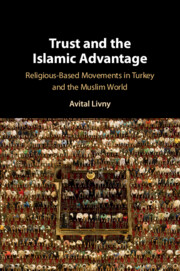1 - Introduction
Published online by Cambridge University Press: 31 August 2020
Summary
What can explain the rapid rise of Islamic politics in Turkey, a historically secular country? Many observers assume that the success and sustained popularity of the Justice and Development Party (AKP) reflects a religious resurgence in Turkey. But when this presumption is directly tested, evidence indicates that Turkish piety may actually be declining over time. This highlights the importance of statistical tests,leveraging variation across individuals, space, or time: they have the potential to overturn widely held assumptions and reopen key questions about the world around us. In finding no evidence of a religious resurgence in Turkey,an alternative explanation is needed. I introduce my trust-based theory of Islamic mobilization, explaining how references to Islam prime feelings of trust among those with a salient religious group identity, and how this group-based trust operates as an effective substitute for more generalized feelings of interpersonal trust, which are largely absent in Turkey and in many other Muslim countries. I contrast my trust-based theory with existing theories of Islamic-based politics and economics and preview the findings of the book, wherein I dismiss the existing explanations and offer support for mine.
- Type
- Chapter
- Information
- Trust and the Islamic AdvantageReligious-Based Movements in Turkey and the Muslim World, pp. 1 - 18Publisher: Cambridge University PressPrint publication year: 2020



